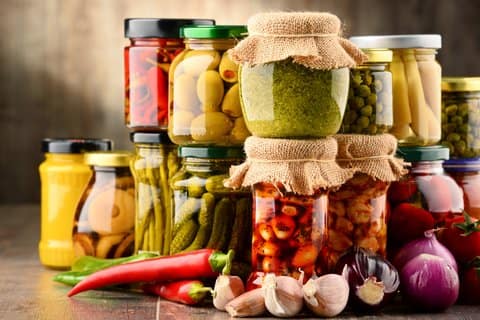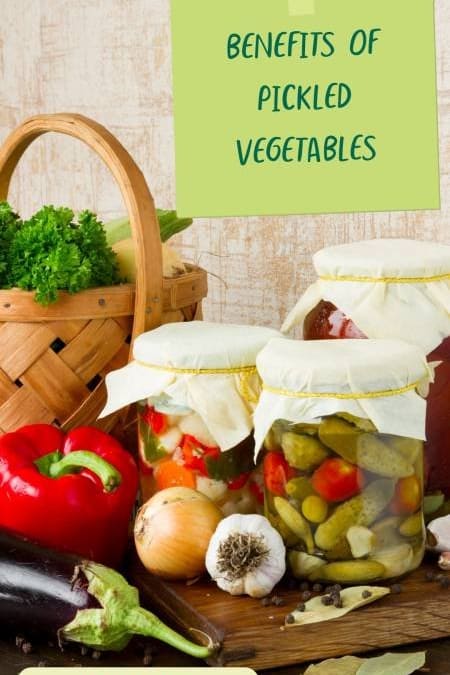Vegan Globetrotter is supported by our audience. When you purchase through one of our links, we may earn a small affiliate commission. As an Amazon Associate I earn from qualifying purchases. Your cost is not affected.
==================
A recipe for pickled vegetables is more than adding a crunchy, tangy bite to your meal. Pickles’ vinegary brine contains vitamins and beneficial microorganisms. Read to learn about the impressive benefits of pickled vegetables!
Pickling is an ancient food preservation method that extends the shelf life of food. While you can use almost any food, many link pickles with pickled cucumbers. The recipe for pickled vegetables involves marinating food in a fermented brine. It then creates lactic acid in a controlled setting with beneficial bacteria. This process allows people to preserve a particular food by anaerobic fermentation.

Benefits of pickled vegetables
Benefits of Pickled Vegetables
Besides this old-fashioned deli food’s deliciousness, pickles may offer various health benefits. They are fat-free and low in calories but have high sodium content. Hence, they are good for people dieting without salt restrictions. People with cardiovascular issues or high blood pressure should avoid or limit pickles. After all, too much salt intake may result in hypertension.
Pickled Vegetables Help in Restoring Electrolyte Balance
Electrolytes (sodium) within the body are essential for healthy functioning. Dehydration is one of the common reasons for losing electrolytes. Since pickles contain a high amount of sodium, they also have electrolytes. Pickle juice consumption could help restore electrolytes during dehydration and aid vomiting. So, incorporating a recipe for pickled vegetables into your diet is also an option.

Pickled vegetables in jars
Moreover, athletes often drink pickle juice to restore electrolytes within their bodies. But folks need to research more to verify if pickle juice is better than electrolyte drinks.
Pickles Contains Antioxidants
Pickled Vegetables and Fruits May Promote Digestive Health
Pickled Vegetables Mix Contains Vital Minerals
They Boost Our Immune System
What to Watch for?
.
Different Types of Pickles
Dill Pickles
Dill pickles are one of the most common and readily available, with many options. It includes spears, whole pickles, chips, and more. These pickles are simple, brined cucumbers with a dill flavor. Recipes for such pickled vegetables vary. While you can incorporate garlic, some taste delicious with peppers or pickling spice.
Kosher Pickles
Like kosher salt, this pickle doesn’t necessarily need kosher for preparing the pickle. Instead, the people use the term for the style of pickling. The process involves using kosher salt brine, garlic, and dill. While adding garlic to dill pickles is an option, it is a must and a traditional part of kosher pickles.
Sweet Pickles
Like dill or kosher pickles, sweet pickles have cucumbers but with a sugar brine. The folks use brine to give your pickle a sweet flavor. Sweet pickles offer all the aromatics and spices but taste great for onion and vinegar.
Bread and Butter Pickles
-
-
Sour pickles: It involves soaking cucumbers in vinegar, water, salt, and spices brine. They have a tart and acidic flavor that adds zing to any dish.
-
Gherkin pickles: Small cucumbers pickled in vinegar and sugar with a sweet-and-sour taste. Ideal as garnishes for cocktails or served alongside charcuterie boards.
-
Cornichon pickles: French-style pickles with a delicious taste. The recipe involves tiny gherkin cucumbers soaked in vinegar, tarragon, and mustard seeds. They have a crisp texture and tart flavor that pairs well with pâté or smoked salmon.
-
Hungarian pickles: Spicy pickled peppers stuffed with garlic and dill before being soaked in brine. These crunchy snacks pack quite the punch and add heat to sandwiches or salads.
-
Polish pickles: It involves traditional fermentation methods. They offer tangy flavors and slightly fizzy textures. Enjoy them on their own or added to sandwiches or salads for an extra burst of flavor.
-
Kool-Aid pickles: Originated in the Southern United States, dill pickles are soaked in Kool-Aid powder. They then mixed with sugar syrup for a sweet-and-sour snack with an eye-catching color. The most popular flavors include cherry, grape, and orange.
-
How to Make Homemade Pickle?
One of the benefits of pickled vegetables is they are easy, and anyone can make pickles at home. You can ferment the cucumbers with sodium water or bring them in vinegar. No matter how you want to make pickles at home, here are the steps:
- But remember to buy fresh, disease-free, and firm cucumbers first. After all, you need decent vegetables to make this work. Poor veggies lead to unfavorable outcomes. Thus, get those you know you’ll enjoy after pickling.
- Since other salts could cloud your brine, use canning or pickling salt.
- Now, incorporate horseradish, dill seed, garlic, and other spices you like.
- Be careful with the boiling and canning process as it could develop harmful bacteria.
- Use air-tight jars for storing your pickles for a more extended period.
Recipes for Pickled Vegetables

benefits of pickled vegetables
Looking for new ways to enjoy pickled vegetables? Look no further! Here are our favorite recipes that will take your pickling game to the next level.
Pickled Red Onions
This recipe for pickled vegetables is one of our favorite kitchen hacks. It is easy to make, and all you need to prep is no more than a few minutes. Then, once you have these bad boys in hand, you can incorporate them into almost any recipe. We love them for chili toppings, but they taste great in everything. You can enjoy them for burgers, hot dogs, tacos, and more. Here is the full recipe.
Pickled Beets
This recipe for pickled vegetables includes pickled beets. The recipe is healthy, tastes terrific, and is ideal for any occasion with a distinctive color. My mom used to make pickled beets, and I couldn’t have enough of them. The primary recipe incorporates mashed potatoes and meatloaf. You can also use it for toppings and salads for their sweet crunch. Here is how you can make refrigerator pickled beets recipe.
Garlic Jalapeno Dill Pickles
Garlic Jalapeno dill pickles are ideal if you want to incorporate some spice into your life. They are perfect for burger toppings. Garlic Jalapeno is a delicious, crunchy snack. The recipe aims towards two directives. First, to bring fresh acidity, and second, to get an enjoyable kick of heat. Here’s how to make Garlic Jalapeno dill pickles.
Pickled Garlic
Recipes for pickled vegetables like garlic are a staple dish in Korea. Try it once, and you will love having it on your dinner table. Because of the pickling process, the garlic loses its sharp edges. This method offers a sweet and tangy flavor. Also, the brining process absorbs all its flavor. The procedure then makes an excellent vinegar substitute. If you want to try it, here is your pickled garlic recipe.
Mexican Pickled Carrots
These crunchy, spicy, tangy carrots make a lovely recipe for pickled vegetables. They are also ideal for serving alongside quesadillas, fajitas, tacos, and enchiladas. Moreover, these restaurant-styled are an excellent mainstay in your cooking place. They are great, especially if you love having colorful, spicy taco toppings. Preparing a Mexican pickled carrots recipe is easy and only takes a few minutes of prep time. If you are not a fan of Jalapeno or want to lessen the spice content in your life, go for something else. You are also free to try the Mexican pickled carrots recipe.
Quick Pickled Sweet Peppers
Easy to make with excellent taste, pickled sweet peppers are perfect for pickling. It’s great if you want to add something to your burger. We often make this recipe for our burger night on the weekend because of its terrific taste. Not only are they straightforward to make, but they taste so yummy on your burgers. Here is how you can prepare and try the pickled sweet peppers recipe.
Pickled Green Beans
One of our favorite recipes for pickled vegetables is the pickled green beans. It’s multipurpose and can serve as a side dish, appetizer, or snack. The green beans, brined in healthy herbs, deliver a refreshing flavor. Garlic, pickling spices, vinegar, and dills also offer a light and refreshing taste. Since the beans immerse in tons of apple cider vinegar, they brim with a sweet, tangy flavor. Try it once, and you will surely love to prepare a large batch of pickled green beans.
Brussels Sprout Pickles
The Brussels sprout pickle is another delicious recipe for pickled vegetables. Many find it appealing due to its crunchiness and a slight spiciness. A few of us are Brussels sprouts fans and prefer to try their pickle version. That’s where Brussels sprout steps in, removing all the bitterness of this root veggie. It does an excellent job by infusing a refreshing dill flavor. Here is what you will need and how to prepare and try this yummy recipe.
Enjoy Eating Pickled Veggies
People know that the pickled veggies have an unparallelled tang and crisp flavors. Pickled veggies are a hit as an appetizer, side dish, or topping for burgers and sandwiches. And the benefits of pickling go far beyond delicious taste. These delectable sweets are also healthy and a great supplement to any diet. They contain digestive and immune-boosting probiotics. Antioxidants protect cells from free radical damage. But one of the best things about pickled vegetables is how easy they are to make at home. You can make homemade pickles with a simple ingredients and basic cooking equipment. Making your own lets you experiment with flavors and spices until you find your favorite.
Other Interesting Reads:
FAQs
What vegetables are easy for pickling?
Besides evergreen cucumbers, you can work with many fruits and vegetables. Beets, bell peppers, cherries, grapes are some easy pickling options.
What are common pickle types?
You can prepare pickles using different methods. Fresh, processed, and refrigeration are some most common pickling techniques.
What are some healthier pickles?
Fermented pickles offer various health benefits. They are rich in probiotics and promote brain and gut health. They also have beneficial bacteria, beta-carotene, and vitamin A.





Don't miss out
when new recipes and information are added!
Join our newsletter for free recipes,
healthy living inspiration, and special offers
You have Successfully Subscribed!